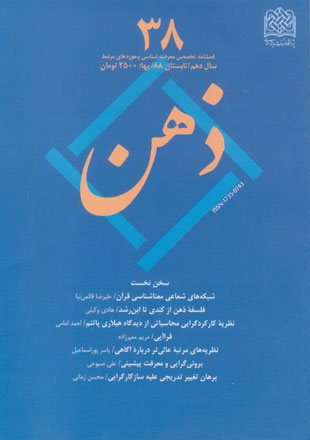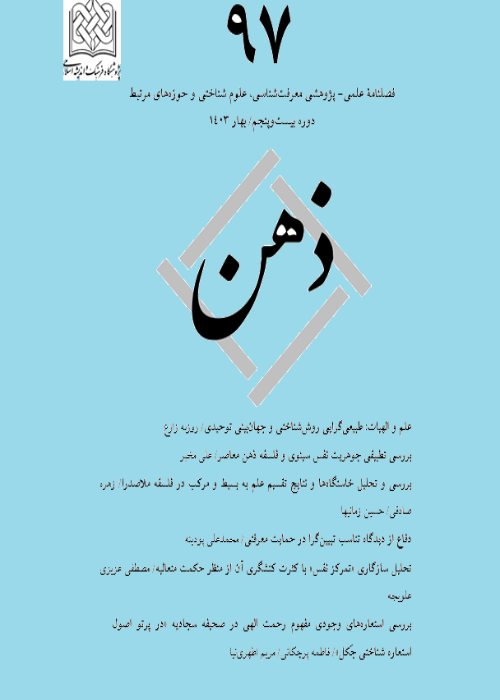فهرست مطالب

فصلنامه ذهن
سال دهم شماره 3 (پیاپی 38، تابستان 1388)
- 196 صفحه، بهای روی جلد: 25,000ريال
- تاریخ انتشار: 1388/05/13
- تعداد عناوین: 8
-
صفحه 5
-
صفحه 41
-
صفحه 115
-
صفحه 125
-
صفحه 157
-
صفحه 165
-
Page 7The theory of radial networks is one of the most important issues of the cognitive linguistics. According to this theory, each and every meaning has a core meaning or a prototype of which other meanings have been developed. This theory has been of great influence on semantics. In the present article, the author will study the influence of this theory on semantics of the Quranic words. According to the author, one of the shortages in the religious studies in general and in the Quranic studies in particular is the lack of clear and precise semantic ideas. In the present article, at first, the theory of radial networks has been described in brief; and then two various versions of the theory have been mentioned. Then and along these lines, the author have discussed instances from the Holy Quran.Keywords: Holy Quran, radial networks, cognitive linguistics, Semantics
-
Page 41Philosophy of mind according to Muslim philosophers is a combination of psychology and modern physiology, and its scope is not limited to study of rational faculty. Nevertheless it is important to know that mind or intellect, with all its theoretical and practical features, is only one part of the philosophers’ science of the soul. Main sources for Muslim philosophers are three essays of Aristotle: De Anima, De Sensu et Senibili, and De Memoria et Reminiscentia. Al-Kindi’s views concerning psychology have been formed through his direct contact with interpretations of De Anima, Aristotle’s Theology- which is a summary of Plotinus’ Enneads-, and a book concerning pure good which is a summary of Proclos’ Principles of Theology and is called in Latin Liber De Causis. In his great book, Essay Concerning Principles of Ideas of People of the Virtuous City, Farabi goes to describe and explain the above point as well as other ones concerning the soul. Following Aristotle’s model, he enlists various faculties of the soul and emphasizes some sort of agreement or disagreement accompanied by each of them. Ibn Sínà thinks that internal senses are located in three ventricles so that in each ventricle two senses, respectively having perception and memory capacity, are located. Common sense and one aspect of the faculty of imagination are the first pair located in the frontal lobe of brain. The common sense matches itself with impressions received through particular senses to provide a single picture of the sense subject. As Aristotle says, this involves impressions which are necessarily associated with the sense subject, i.e. a phenomenon in which memory combines previous sense impressions with the present feeling. Given his familiarity with Aristotle’s book, Averroes regards memory as a product of continuous abstraction or spiritualization. The form of external subject is sensed firstly with its own membranes or material accidents. Then common sense and after it the faculty of imagination receive conscious correspondences of this form in an ever-increasing immaterial manner; and then the faculty of cognition which acts as an independent sense begins its work.Keywords: philosophy of mind, active intelligent, faculty of cognition, rational faculty
-
Page 79The main theme of the present article is to describe computational functionalism as viewed by Hillary Putnam. The author, at first, describes kinds and aspects of functionalism, and then he goes on to discuss the background and origin of this theory, and describes the nature of functionalism in brief. Then, he shows details of development of this theory in Putnam’s changing thought; the author follows his intellectual development with modifications made in his conception of this idea. The end of this development (which is critique and rejection of the theory by him and others) will be described in the next writing.Keywords: functionalism, computational functionalism, multiple verifiability, Turing machine, mental states, functional states
-
Page 115Some physicalists speak of development of physicalism in the field of epistemology without taking into account reductionist points. They try to develop this subject through formal model of theories which are in a direct relation to Supervenience. They believe that all facts are supervenient on physical facts, in the sense that physical fact determines all facts, but not in the sense that all facts are reduced to physical facts. In the present article, the author tries to take a historical view, and discuss main topics and kinds of supervenience.Keywords: supervenience, dimensions of supervenience, kinds of supervenience
-
Page 125It is not an easy task to provide an explanation for “phenomenal consciousness”; and that is why the problem of consciousness is called “the hard problem of consciousness”. Since explanation of representational (intentional) mental states is free from conceptual challenges, many philosophers seek to reduce the problem of consciousness to representation in order to solve the problem. Representational theories concerning mind may be divided into two general groups: “first order representation” and “higher-order theories”. In the present article, the author speaks of higher-order theories. In these theories, consciousness is identified with the higher order states representing first order ones. This higher order state may be “thought” or “perception”; the former is called the theory of “higher order thought” and the latter is called the theory of “higher order perception”. The theory of higher order thought comes, in turn, in three versions: theory of actual and relative higher order thought; theory of dispositional higher order thought; and the theory of essential higher order thought (extensive essentiality). Recently, a new higher order view has been introduced which is known as “theory of higher order radial states”, and is somehow similar to “extensive essentiality”. In the present article the author discusses general arguments for higher order theories (against first order representationalism”, arguments posed by each higher order version against other rival versions, and objections to each of them. In conclusion, the author will describe general objections to all higher order theories.Keywords: consciousness, phenomenal experience, qualitative experience, intention, representation, higher order representation, higher order thought, higher order perception, extensive essentiality, higher order radial states
-
Page 157Externalism is often characterized as the doctrine that the contents of our mental states are determined at least in part by the external environment. On the other hand, it is widely held among philosophers that we have privileged and indirect knowledge to our own mental states. Mckinsey has provided an argument which results in an incompatibility between self knowledge and the content externalism.Keywords: externalism, mental states, self knowledge, a priori knowledge
-
Page 165One of the important questions in philosophy of mind concerns nature of mental intentional states and the way to determine them. Some experiences such as that of twin earth confirm externalism in contents, in the sense that at least in some cases content is determined by external, environmental, and most likely social and historical facts. On the other hand, it is intuitively accepted that we have a distinct (and free from experience) access to the contents of our own ideas. But compatibility between distinct access and externalism is controversial. After some prefatory notes concerning externalism and knowledge of the soul, one of the arguments for their incompatibility (argument of gradual change) will be introduced in the present article; then two objections against this argument will be described and discussed: in the first one and through an study of the theory, alternatives of the claim “second order content is determined based on the first order content” are considered as confirming subject’s knowledge of the contents of his own thought; and the other does not regard internalism as being based on evidence; and thus does not accept theoretical efficiency of the alternative introduced in internalism. Then, it is shown that if those who believe in these critiques manage to ascribe to the subject knowledge of the content of his own thought, that is a knowledge which requires justification. Then, having separated negative and positive independence of a justified belief from experimental facts, the author shows that argument of gradual change rejects only negative independence; and knowledge of the mind may be still regarded in the positive sense as being independent from experience.Keywords: externalism, argument of gradual change, introspection, compatibilism


